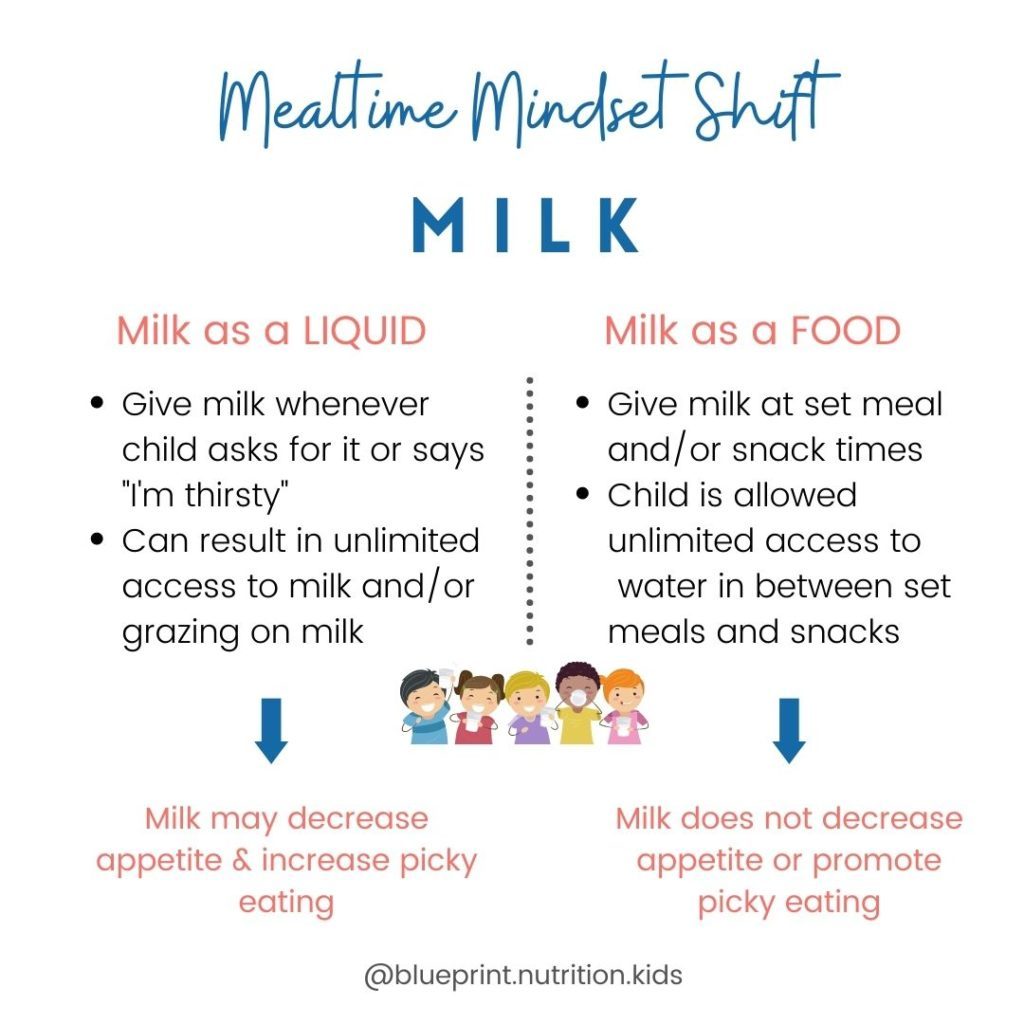When you think of a picky eater, oftentimes the image of a mischievous little kid ensues. A child who is deliberately refusing foods because they want to make their parent’s lives miserable! Sound familiar?
But are kids intentionally trying to be difficult? Or, do their actions around food make sense based on their experiences with food, their feeding/eating environment, their medical issues, their personality etc.? I side with the latter!
When evaluating the potential contributing factors to a child’s picky eating behaviours, one factor (of MANY factors!) that I look at as a dietitian is around a child’s milk consumption. Did you know that picky eating can be influenced by the volume and timing of a child’s milk drinking?
Is your toddler nursing constantly or taking a bottle with enthusiasm but not so interested in the food on his tray? If so, you may want to take a closer look at the “what”, “when”, and “how much” of their milk drinking!
The WHAT of milk drinking
At 1 year of age, your baby is officially a toddler! This means you can graduate to a homogenized cow’s milk (3.25% milk fat). Or, you can certainly continue to breastfeed or do a combo of the two. If your child is growing well, the Canadian Pediatric Society advises that there is no need to continue an infant formula. Research supports that there may be a tendency to give formula past the one year mark out of fear of a child’s poor appetite and it tends to be given instead of food (not in addition to food). This certainly won’t help the picky eating situation.
If you’re raising your child without dairy, it is recommended that you continue to breastfeed, or, continue to provide a suitable non-dairy infant formula until two years of age (such as soy infant formula).
After two years of age, plant-based milk alternates are an option. However, it’s important to be informed about which ones would work best for your child. There are so many factors to consider. That’s another post for another day!
Once your kiddo hits two, experts advise that you can drop down to a lower fat milk (like 1% or 2%). But, just so you know, there really isn’t any compelling evidence that low fat dairy impacts weight. So, buy the milk your family enjoys best. My general recommendation though is to avoid skim milk as fat is important to facilitate the absorption of some of the nutrients in milk.
What about Toddler Milks?
There’s a 99.99% chance that your toddler doesn’t need “toddler milk” or “stage 3” milk.
What’s in toddler milk that companies make you feel like your kid absolutely needs it over homo milk? Nothing that’s worth the added cost. (P.S. Research shows that companies have marketed toddler milks heavily ever since their sales of infant formula have decreased. There is a push for countries to better regulate the marketing of these products.)
They market it for its omega-3 content (particularly DHA) which is a mere 32 mg per cup. You can get triple that from one omega-3 enriched egg for way less of your hard-earned money. And on the note of price … it costs 7x the amount that homogenized milk does. Again, save your money for the eggs or salmon with omega-3s.
Don’t forget that toddler milk is twice as sweet as cow’s milk and that sweet taste, though easy for kids to like, isn’t ideal from a nutrition standpoint. They don’t need it. And I’m sure you’d rather have your toddler enjoy a cookie with you every once in a while then get that sugar from expensive toddler milk.
The WHEN of milk
All day milk buffets don’t help picking eating. It certainly is easier to drink one’s main source of nourishment than eat it. But allowing your child to drink milk anytime isn’t helping the situation.
At the age of 12 months, I encourage families to make a mealtime mindset shift and start to see milk as a FOOD rather than a FLUID.

Sure, it IS a fluid, but it’s not the ideal drink to provide anytime your child is thirsty. When you see milk as a food, you will offer it at set snack and/or mealtimes and switch to offering water between eating times. The result? Their tummy can actually develop hunger between meals and snacks because water is not filling like milk is. True hunger is a good thing because it helps kids become more adventurous at the table.
The HOW MUCH of milk
You’ve likely heard me say before that kids are responsible for the “how much” of eating. It’s true! As parents or caregivers, we provide food and kids get to decide how much they want to eat.
However, when it comes to milk, there are some guidelines that we want to follow. Not to control our kids eating but rather, to ensure balanced nutrition.
The Canadian Pediatric Society recommends that children drink 2 cups (no more than 3 cups) of milk at 12 months of age. Why the specific recommendation?
Well, this is for a number of reasons. Getting adequate milk is important to ensure kids are getting calcium and vitamin D, two nutrients found in milk that promote optimal bone health. However, drinking too much milk is a known risk factor for developing iron deficiency. This is because milk lacks iron and is filling, so it decreases a child’s appetite or desire to eat other iron-rich foods.
So, how much milk is your child drinking?
Some kids can tolerate close to 3 cups of milk daily and still be ravenous for meals and snacks. For others, that’s too much and definitely contributes to picky eating at supper. Two cups is closer to what they can manage without negatively affecting their appetite for food.
If you’ve got questions about how milk may be affecting your child’s picky eating, contact us today! We’d love to jump on a call with you and help you fix your feeding frustrations!






